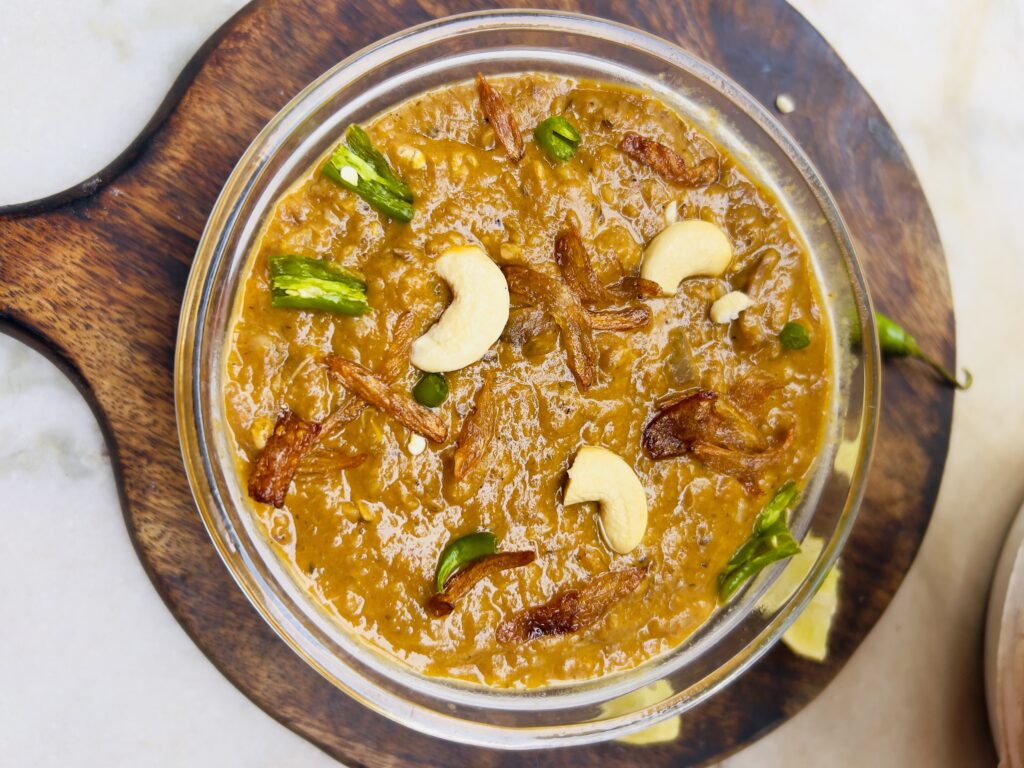
History of Mutton haleem
Mutton Haleem Recipe – History, Origin & Significance
Meta Title: Mutton Haleem Recipe – Hyderabadi Style | History, Origin & Ramadan Significance
Meta Description: Discover the rich history and origin of Mutton Haleem – from ancient Harees to Hyderabadi Haleem. Learn why it’s the perfect recipe for Ramadan Iftar.
What is Mutton Haleem?
Mutton Haleem is a delicious, protein-rich stew made by slow-cooking mutton with cracked wheat, lentils, and spices until it turns into a smooth, porridge-like consistency. This hearty dish is a staple during Ramadan, especially at Iftar, and is a beloved part of Hyderabadi cuisine.
🔗 Also check out our Hyderabadi Mutton Haleem Recipe for step-by-step instructions.
History & Origin – From Harees to Haleem
The roots of haleem lie in the Middle Eastern dish called “Harees” (or Harisa). This ancient dish, made with meat and pounded wheat, was documented as early as the 10th century by Arab historian Abu Muhammad al-Muzaffar ibn Sayyar in Baghdad.
It eventually made its way to the Indian subcontinent during the Mughal era, brought by Arab and Persian traders and chefs.
Evolution into Hyderabadi Haleem
When Harees arrived in Hyderabad, local cooks added Indian spices, ghee, fried onions, and lentils to suit regional tastes. This unique adaptation became known as Hyderabadi Haleem, now famous worldwide.
In fact, Hyderabadi Haleem was awarded Geographical Indication (GI) status for its distinct flavor, texture, and traditional cooking method.
🔗 Explore our Hyderabadi Recipes Collection for more authentic dishes.
Why Mutton Haleem is a Ramdan Favorite
During the holy month of Ramadan, Haleem becomes one of the most popular dishes for breaking the fast (Iftar). It’s:
High in protein and fiber
Easy to digest
Energy-boosting after long hours of fasting
It’s not just food—it’s comfort in a bowl.
The Meaning of “Haleem”
The name Haleem comes from the Arabic word meaning “patient”-a fitting tribute to the hours-long cooking process that gives this dish its signature smoothness. Preparing Haleem requires patience, love, and dedication, which is part of what makes it so special.
🔁 Internal Links
Easy Mutton Recipes
Ramadan Special Recipes
Traditional Indian Dishes
Slow-Cooked Meat Recipes
Ingredients
Ingredients Broken wheat 1 cup 100 grams
Moong dal (skinless) 2 tbsp
Masoor Dal s(skinless) 2 tbsp
Chana Dal 5 tbsp
Mutton / Beef 1.5 kg
Salt 2 tsp
Red chilli 2 tbsp
Turmeric powder 1 tsp
All spices powder 2 tbsp
Ginger garlic 4 tbsp
Yogurt 4 tbsp
Oil 1/2 cup
Handful of Fresh coriander and Fresh mint
you can get a complete video tutorial on my youtube channel Pakwan e khaas
link of recipe is down below